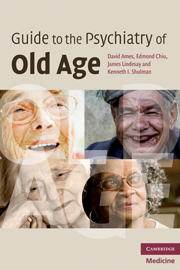28 results
Geriatric Liaison: An Approach to Medical Management on a Psychogeriatric Unit in a General Hospital
-
- Journal:
- Canadian Journal on Aging / La Revue canadienne du vieillissement / Volume 10 / Issue 1 / Spring/printemps 1991
- Published online by Cambridge University Press:
- 29 November 2010, pp. 56-63
-
- Article
- Export citation
6 - Delirium
-
- Book:
- Guide to the Psychiatry of Old Age
- Published online:
- 10 November 2010
- Print publication:
- 01 July 2010, pp 57-68
-
- Chapter
- Export citation
3 - Differential diagnosis – the 3Ds
-
- Book:
- Guide to the Psychiatry of Old Age
- Published online:
- 10 November 2010
- Print publication:
- 01 July 2010, pp 23-30
-
- Chapter
- Export citation
Copyright page
-
- Book:
- Guide to the Psychiatry of Old Age
- Published online:
- 10 November 2010
- Print publication:
- 01 July 2010, pp iv-iv
-
- Chapter
- Export citation
2 - Assessing the elderly psychiatric patient
-
- Book:
- Guide to the Psychiatry of Old Age
- Published online:
- 10 November 2010
- Print publication:
- 01 July 2010, pp 5-22
-
- Chapter
- Export citation

Guide to the Psychiatry of Old Age
-
- Published online:
- 10 November 2010
- Print publication:
- 01 July 2010
Foreword
-
- Book:
- Guide to the Psychiatry of Old Age
- Published online:
- 10 November 2010
- Print publication:
- 01 July 2010, pp vii-x
-
- Chapter
- Export citation
Frontispiece
-
- Book:
- Guide to the Psychiatry of Old Age
- Published online:
- 10 November 2010
- Print publication:
- 01 July 2010, pp ii-ii
-
- Chapter
- Export citation
Abbreviations
-
- Book:
- Guide to the Psychiatry of Old Age
- Published online:
- 10 November 2010
- Print publication:
- 01 July 2010, pp xiii-xiv
-
- Chapter
- Export citation
Contents
-
- Book:
- Guide to the Psychiatry of Old Age
- Published online:
- 10 November 2010
- Print publication:
- 01 July 2010, pp v-vi
-
- Chapter
- Export citation
Guide to the Psychiatry of Old Age - Half title page
-
- Book:
- Guide to the Psychiatry of Old Age
- Published online:
- 10 November 2010
- Print publication:
- 01 July 2010, pp i-i
-
- Chapter
- Export citation
Index
-
- Book:
- Guide to the Psychiatry of Old Age
- Published online:
- 10 November 2010
- Print publication:
- 01 July 2010, pp 137-143
-
- Chapter
- Export citation
4 - The dementias
-
- Book:
- Guide to the Psychiatry of Old Age
- Published online:
- 10 November 2010
- Print publication:
- 01 July 2010, pp 31-48
-
- Chapter
- Export citation
10 - Substance abuse and Iatrogenesis in late life
-
- Book:
- Guide to the Psychiatry of Old Age
- Published online:
- 10 November 2010
- Print publication:
- 01 July 2010, pp 113-120
-
- Chapter
- Export citation
Guide to the Psychiatry of Old Age - Title page
-
-
- Book:
- Guide to the Psychiatry of Old Age
- Published online:
- 10 November 2010
- Print publication:
- 01 July 2010, pp iii-iii
-
- Chapter
- Export citation
9 - Neurotic and personality disorders
-
- Book:
- Guide to the Psychiatry of Old Age
- Published online:
- 10 November 2010
- Print publication:
- 01 July 2010, pp 95-112
-
- Chapter
- Export citation
5 - Behavioural and psychological symptoms of dementia
-
- Book:
- Guide to the Psychiatry of Old Age
- Published online:
- 10 November 2010
- Print publication:
- 01 July 2010, pp 49-56
-
- Chapter
- Export citation
7 - Mood disorders in late life
-
- Book:
- Guide to the Psychiatry of Old Age
- Published online:
- 10 November 2010
- Print publication:
- 01 July 2010, pp 69-86
-
- Chapter
- Export citation
8 - Schizophrenia and related disorders in late life
-
- Book:
- Guide to the Psychiatry of Old Age
- Published online:
- 10 November 2010
- Print publication:
- 01 July 2010, pp 87-94
-
- Chapter
- Export citation
12 - The future of the psychiatry of old age
-
- Book:
- Guide to the Psychiatry of Old Age
- Published online:
- 10 November 2010
- Print publication:
- 01 July 2010, pp 129-136
-
- Chapter
- Export citation

